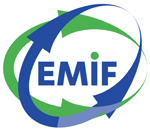On the 21st and 22nd of September 2017, the European Institute for innovation through Health Data (i~HD) and the European Medical Information Framework (EMIF) hosted the joint meeting ‘Realizing the Value from Health Data – Improving Care and Research”. Well over 200 delegates attended the meeting which took place at the Hospital ‘Universitario 12 de Octubre’, Madrid, Spain.
The first day of the meeting was hosted by i~HD. During the kick-off session, representatives from the Spanish and the Estonian health ministries elaborated on the importance of reusing clinical data for improving health care and clinical research. In addition, they emphasized the need for a dialogue with patients, providing feedback on the results achieved by allowing the re-use of their data. During the remainder of the morning, the goals and challenges of a transition towards value-based and outcomes-based health care were discussed. Mary Baker, chairperson of the session, stated: “We should stop talking about the cost of health care and start talking about the investment of health in the long run”. The second half of the day focused on the empowerment of patients and the development of solutions that lead to a healthy data ecosystem with quality data and in which trust takes a central place. This mutual trust in the bona fide re-use of data is of utmost importance to advance the field, or as a patient representative put it: “In the end, it’s all about trust”.
The second day of the meeting, the EMIF project took the stage. EMIF is an Innovative Medicines Initiative 1 (IMI) funded project and currently in its final year. During the past five years, EMIF has been developing a common technology and governance framework and an online platform for the identification, assessment, access and (re)use of health data across academia, industry, payers and governments. EMIF has also had two disease foci to evaluate this framework, EMIF-AD and EMIF-MET, to apply these tools and technologies to identify novel biomarkers in Alzheimer’s and metabolic diseases.
Prof Dipak Kalra, President of i~HD, introduced EMIF as: “If you wanted an example of the best in Big data for medicine, EMIF would be it”. The day started with an overview of EMIF’s achievements on building and using the EMIF platform, but also in applying these tools to the field of Alzheimer’s, and obesity. Throughout the day, many different aspects concerning the re-use of health were presented and discussed with the audience. Among these were technical aspects such as the harmonization of electronic health record data to the OMOP common data model (via the collaboration with OHDSI), and the harmonization of AD cohort data to the Switchbox common data model which was developed within EMIF specifically for this purpose. Additionally, many non-technical aspects with regards to governance aspects, the expansion of data sources and collaborations, and the sustainability and legacy of EMIF elements.
The day ended with a panel discussion and when asked what the panel hopes would be the legacy of EMIF, Michel van Speybroeck, panel member and Janssen Data Sciences, replied, “The ultimate objective for me is that the work we put in, results in improved health outcomes for everyone. I hope that we succeeded in laying the foundation for a data ecosystem in which health data can be reused in good trust and for the greater benefit of patients”. Prof Sir Simon Lovestone, EMIF Co-Coordinator and Professor of Translational Neuroscience, Oxford, and Nigel Hughes, EMIF-Platform Co-Coordinator and Janssen Pharma R&D, added to this that: “80% of bioinformatics is about humans, not the data itself. If we can get patients and all partners involved to trust each other, and we couple this to our endless ambition, we can really make a difference in patient’s lives.
A downloadable version of the full slide deck of the day is here.
